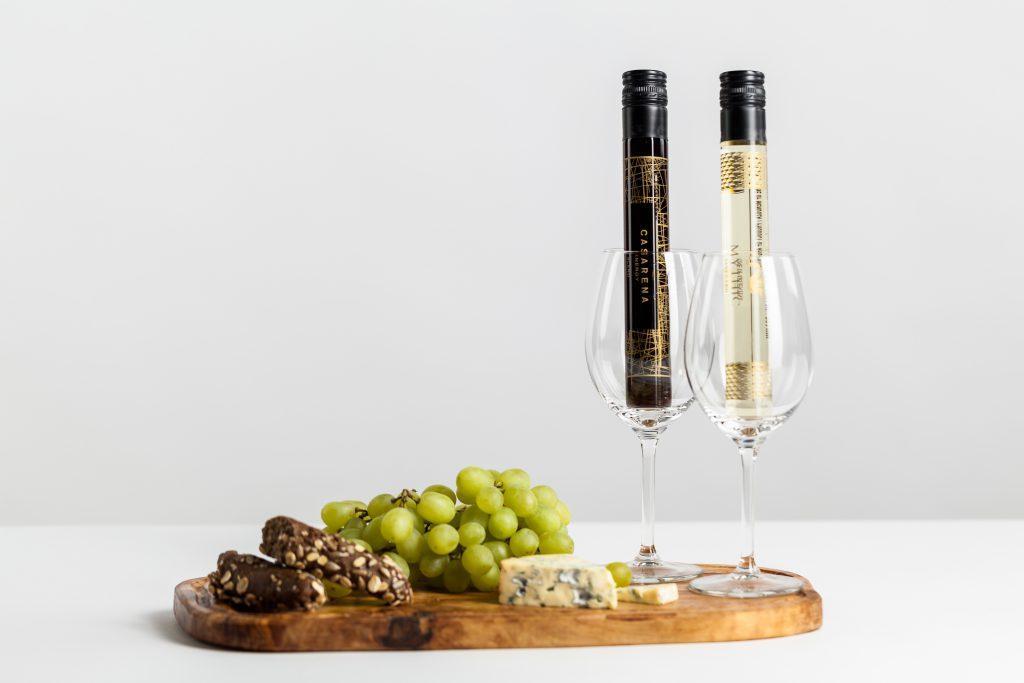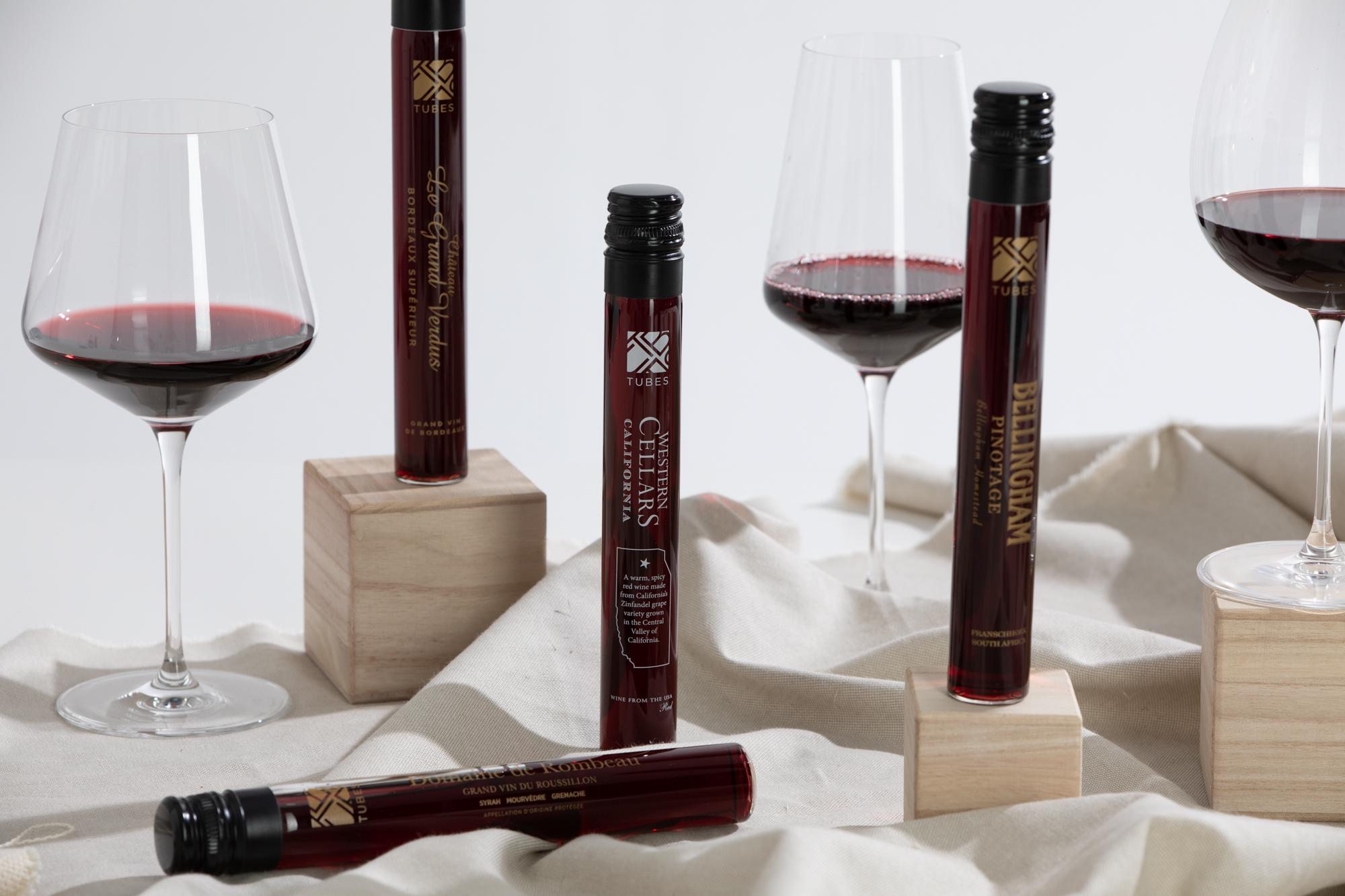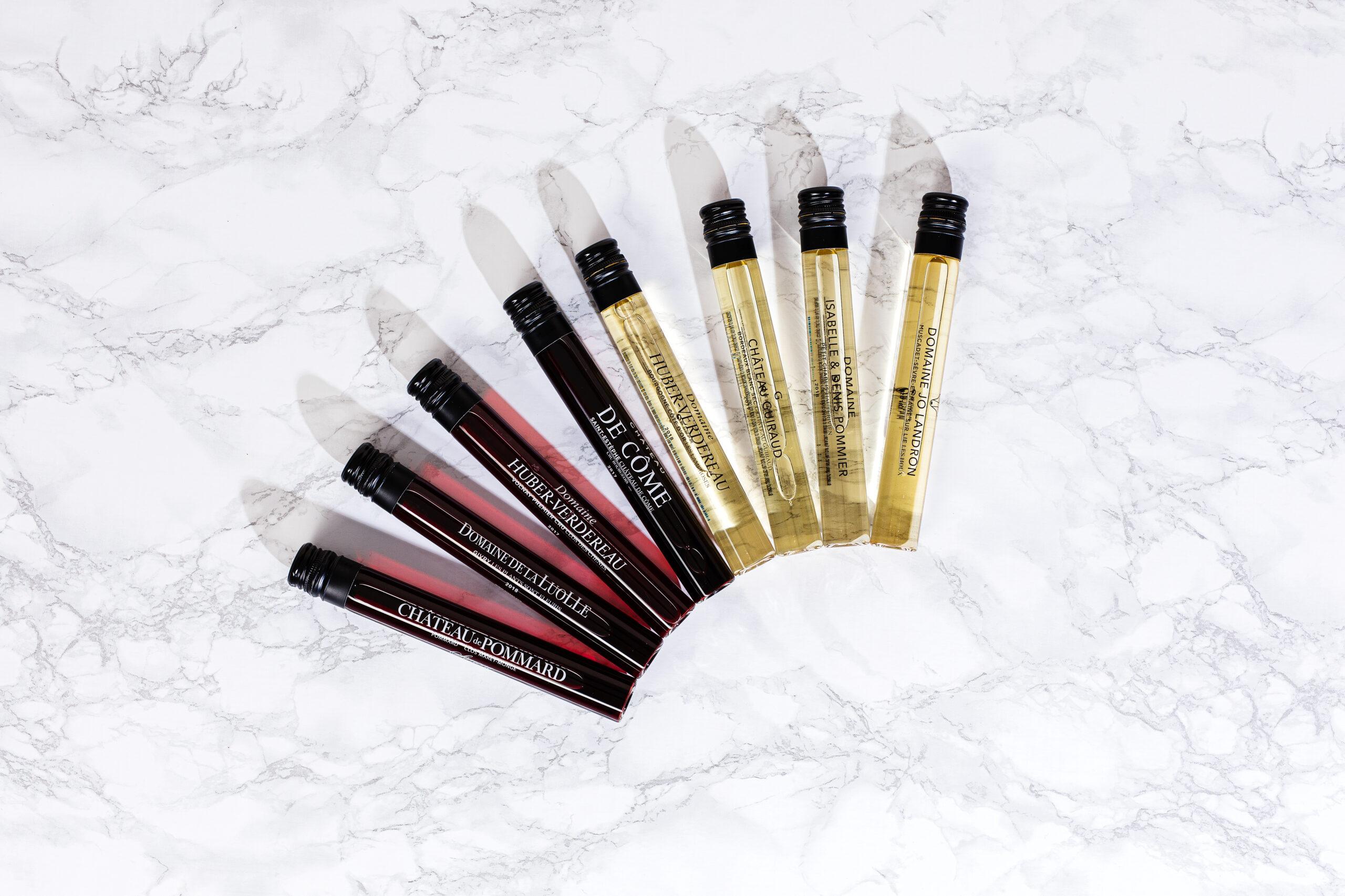Discover
our bottle
your own
samples machine
Discover our bottle
your own samples machine
Wine Business International – Issue 06-2020
By James Lawrence
Wine Business International
The growing number of Zoom wine tastings is driving a new interest in small formats. James Lawrence has the story.
The cork versus screwcap debate continues to arouse strong feelings on both sides. The removal of the cork, for some, is a romantic and integral part of the wine drinking process in restaurants. But if the wine trade can be inflexible about alternative closures, how will it feel about the mass distribution of wines in 50ml glass tubes?
Type “wine test tubes” into Google and the results are instantaneous. A growing number of retailers are marketing tasting kits which typically package five or more wines sealed in 50ml/100ml glass or plastic tubes. Independent London retailer Honest Grapes promoted a box set of five red and white wines sealed in 50ml tubes, coamplemented by online tasting courses sold as Wine Therapy Sessions. At first glance, the package resembles a science experiment, rather than an engaging and sensory wine experience. According to the founder of Honest Grapes, they’ve become incredibly popular since the Covid-19 pandemic became daily news. A bourgeoning stay at home culture is likely to create further consumer interest.
Wine in a tube
Makers of this highly portable format are catering to a diverse range of clients – consumer markets are just only one slice of an expanding pie. Glen Ritzen is the founder and CEO of Tubes, a company based in The Netherlands. The firm’s manufacturing plant and distribution centre, situated just outside of Amsterdam, will bottle approximately one million tubes by the end of 2020.
“We started the business in 2015, although our sample-size tubes did not reach the market until 2018,” said Ritzen. “The demand for our products has been rising consistently since then – the global pandemic can only fuel more growth and expansion.” He added that wineries are increasingly doing tastings and workshops via digital channels, “which naturally greatly benefits our business model. Shipping smaller formats like ‘test tubes’ is far more cost efficient than sending 70cl bottles across the world.”
His firm produces and distribute single serve (still) wines, cocktails and spirits contained in test tubes. Clients can select either 50 or 100ml formats, sealed in recyclable glass or plastic. The latter option is more cost-effective, as glass tubes are significantly more expensive to manufacture. According to Tubes, the consumer market now accounts for 40% of their total sales. Their retail partners include Ahold Delhaize, Aldi, Jumbo and Kaufland. Major clients in the gifting sector include Vinebox (US), Winebuyers and Prezzybox (UK).
“The reason to opt for more expensive glass is the shelf life of the wine,” said Ritzen. “A wine sealed in a glass tube will last 24 months – plastic-sealed wines will oxidise after about nine months.”
At the moment, Ritzen sees the potential for exponential growth. In addition to marketing corporate gift packs via the company’s website, Tubes continues to form new partnerships with wineries, retailers and stakeholders across the travel sector.
“I’m particularly excited about further collaborations with airlines and their suppliers,” he said. He then listed a series of accountant-friendly advantages. “Tubes are space-saving, weight-saving, time-saving, cost-effective and sustainably-produced formats. Airlines will see the obvious benefits of innovative, 100% recyclable glass and PET Tubes.”
This confidence may well be justified. The pandemic has severely affected the aviation sector, and airlines are certain to be looking for ways to save money. Previously, Emirates, Etihad and TAP abandoned 70cl bottles and reverted to 187ml versions, in order to avoid potential cross contamination. But perhaps 50ml tubes offer a better solution?
Moreover, the benefits of virtual tastings will remain attractive to wineries regardless of whether a vaccine becomes widely available in 2021. Why fly journalists around the world, when digital events can be undertaken for a fraction of the cost? As that is required is a Zoom account and an efficient way of distributing samples.
“We now work with Argentine winery Catena Zapata, which is further evidence that both producers and their partners in the wine trade take this format seriously,” says Ritzen. “Tubes enables Catena to easily send samples across the world.”
He adds that the liquid to be transferred to smaller formats can be delivered in bulk (1000L, 500L, 250L), bag-in-box, or bottles. The list of interested parties is growing: Château de Pommard, Grands Chais de France and Robert Parker’s Wine Advocate are all enthusiastic adopters.
Tubes operates in an increasingly competitive environment – Chinese manufactures Henghua Glass and Yi Fan Packaging are also diversifying towards creating wine sample sizes, in addition to supplying cosmetic brands and science laboratories. European-based companies like Tubes cannot compete on price or volume.
Yet Ritzen said his firm offers a competitive edge. “Of course, there are rivals in this market, but we have partnered with a leading glass manufacturer in Holland to develop state-of-the-art technological procedures.” He added that Tubes’ patented technology, “preserves the organoleptic qualities of wines, which makes us able to guarantee a shelf life between nine months (recycled PET tubes) and 24 months (glass tubes) after bottling. This makes our product unique for a lot of commercial sales channels.” He added that their production facilities are fully certified, with the authority to bottle organic products.
The company is experiencing a growth rate of 300% year on year, which can only be bolstered by evolving business and consumer behaviours. This is the unfortunate but undeniable reality of the pandemic; it provides a significant boost to certain industries, while severely damaging others. Businesses which can provide a cheaper and workable alternative to trade fairs and consumer tastings can only prosper.
Other formats
However, even if the pandemic had never occurred, it is likely that the manufacturers of single serve vessels would have celebrated a profitable 2020. Even in the context of a (relatively) buoyant on-trade, at home consumption in 2019 grew in markets like the UK, Germany and US. This has been partly driven by a significant cultural shift, as consumers – particularly Millennials – become keen adopters of different formats. The recent emergence of premium wine styles available in cans and bag-in-box, coupled with an unprecedented level of investment, suggests that newer formats are poised to grab more market share.
Ryan Harms, founder and owner of Union Wine Company, is one such investor. His firm markets a number of wines packaged in the can format across the US.
“Canned wine is no longer a trend, it’s a category,” says Harms. “My impression is consumers are looking for options that provide portability and portions that better fit their needs. There are a lot of consumers who would like to have wine on a regular basis but can’t rationalise a 75cl bottle so instead look for other options.”
Garcon Wines is another key innovator. They specialise in rebranding bulk wines for their current business customers – primarily consumer gifting companies. Their USP is the packaging; their wines are sold in a flat plastic bottle format that fits into any household letterbox.
“Our primary focus is on expanding our range of sustainable wine packaging solutions. This includes different bottle shapes around the Bordeaux and Burgundy shapes, different bottle sizes, and also the secondary packaging for single and multiple bottles that allow for our bottles to be transported, delivered or sold more efficiently and effectively,” said Santiago Navarro, CEO and Co-Founder.
Many of the newer formats, including glass and plastic tubes, can also make strong sustainability claims. This only adds to their attractiveness from a marketing perspective. “We aim to deliver the most environmentally friendly product we can produce,” said Ritzen, adding that the company invests heavily in research and development.
Lulie Halstead, senior analyst at Wine Intelligence, added that, “We have reached a point where utility and functionality are at least as important to consumers as tradition; our evidence shows that consumers used to trialling new formats in other categories now expect wine to offer the same innovation, particularly in terms of convenience and size.”
That being said, the 75cl bottle is in no danger of being usurped anytime soon. As Ritzen observed, “we are not here to replace bottles, but to add value and create innovative alternatives for wineries, particularly in this unusual context.”
The wine industry appears to be moving towards a point where the functionality and cost-effective nature of alternative formats like tubes will become a key consideration for both premium and mass-market brands. In order to capitalise on this emerging reality, Ritzen reveals that the company will open a second manufacturing and distribution facility in Bordeaux in 2021. Thereafter, new bottling plants will open in North America, South America, and the Asia Pacific region.
Yet for some time now, critics have been exhorting the wine trade to be more innovative. It was once obligatory for marketeers and columnists to wring their hands about the industry’s failure to engage with younger consumers.
The test tube revolution suggests that a growing number of producers are willing to embrace change.



